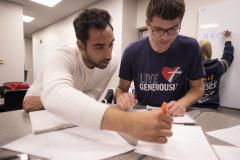A new five-year grant of $1.4 million has been awarded to the Student Support Services (SSS) program at Ripon College by the U.S. Department of Education, TRIO division.
The goals are to increase the retention and graduation of first-generation students, whose parents/guardians did not complete a four-year college degree; students who come from families with lower incomes relative to family size; and students with physical or learning disabilities.
Ripon offers academic support and guidance, supplemental grant aid, educational-cultural opportunities, a Bridge program that helps students make a smooth transition from high school to college, financial literacy exposure and graduate school information.
Student Support Services has received consistent grant funding from the Department of Education in every grant cycle since inception of funding at Ripon College.
The staff includes Dan Krhin, executive director; Lisa Zeman, associate director and disabilities coordinator; and Myra Gilreath, assistant director. They meet with students daily throughout the semester.
“First-generation students are as talented as legacy students, yet first-generation students have not had the advantage of having the guidance and information from a parent or parents who have graduated from a four-year college or who have gone on to graduate school,” Krhin says.
“One of the most important parts of the SSS initiative is to help students understand the financial and personal value of earning a four-year college degree and to assist students in understanding the relationship between selected majors and career options,” he says. “I know that establishing strong relationships with our students builds trust and a sense of belonging in higher education. With this information and confidence comes future academic and professional success for many students who may not have clearly understood how college functions to create a career pathway.”

Hanan Majid ’21 of Kashmir, left, and Adrian Granados ’20 of Ripon, Wisconsin, collaborate on a project in a pre-COVID-19 photo.
